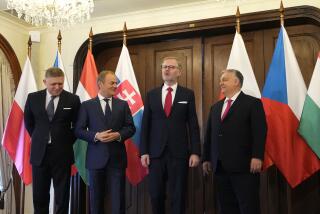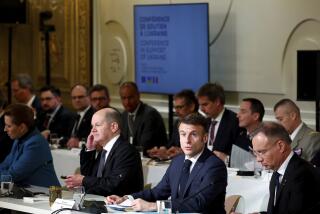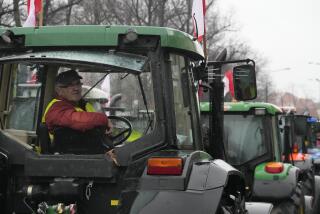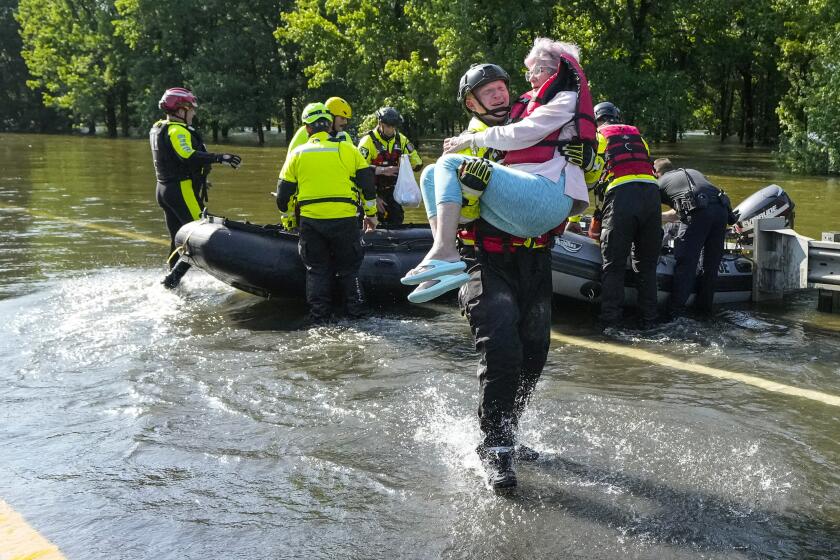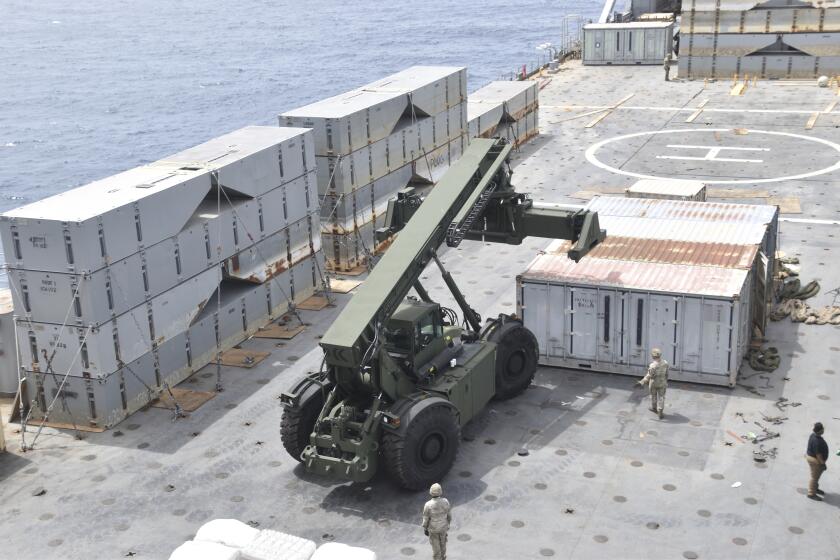Group of 7, European Union warn Russia against Crimea gambit
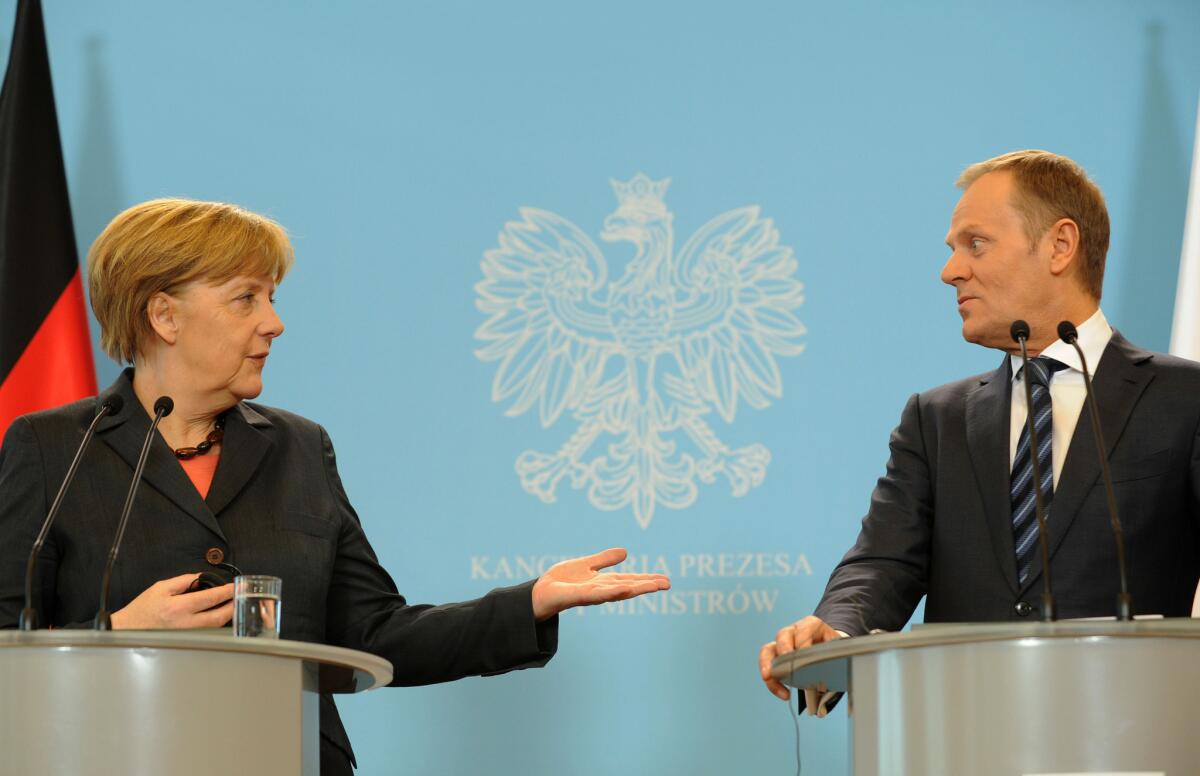
The leaders of Germany and Poland warned Russia on Wednesday that it has until Monday to agree to work with an international “contact group” to resolve the crisis in Ukraine’s Crimea region or face immediate sanctions.
At a meeting in Warsaw, Polish Prime Minister Donald Tusk and German Chancellor Angela Merkel put the Kremlin on notice that what are seen as its provocative moves aimed at annexing Crimea -- despite Moscow’s disavowal -- threatened to dramatically escalate tensions throughout Europe.
European Union leaders meeting in Brussels a week ago laid out a three-stage sanctions regime that Moscow would face if it refused to negotiate an end to the armed standoff over Crimea, where Russia has deployed thousands of troops and seized Ukrainian government and military sites.
Ukraine’s interim government said Wednesday that Russia has also amassed 80,000 troops along its border with Ukraine. Russian officials denied that accusation, as they have reports and video evidence of Russian forces flooding into the Crimean peninsula ahead of a controversial referendum on the region’s future set for Sunday.
“We have to recognize, even though we will continue to move forward with this attempt to form a contact group, that we’ve made no progress,” Merkel told reporters at a joint news appearance with Tusk in Warsaw.
Merkel’s reminder to Russian President Vladimir Putin of severe consequences if his government persists with destabilizing moves in Ukraine followed a warning Tuesday from the Group of 7 industrialized countries that Moscow must “cease all efforts to change the status of Crimea.”
Russia was admitted to the exclusive clique of powerful nations in 1998, after which the forum was referred to as the Group of 8. But the G-7 leaders have sidelined Russia in confronting its intervention in Ukraine and suspended planning for a Russian-hosted summit in June.
Sunday’s referendum in Crimea -- a strategic, largely Russian-speaking area that is home to 2 million people -- asks voters whether they want to secede from Ukraine and become an independent country.
The pro-Moscow regional government installed by Russian gunmen two weeks ago had originally planned to ask voters whether they wanted Crimea to be annexed by Russia. However, the referendum wording was revised Tuesday, apparently in an effort to shield the Kremlin from the consequences of engineering a transfer of a sovereign country’s territory in breach of the U.N. Charter and other international treaties and laws.
The G-7 statement said the referendum is “a deeply flawed process which would have no moral force,” and that the outcome of the vote would “have no legal effect.”
Merkel and Tusk also called for Ukraine to sign the European Union association agreement that was the catalyst for a three-month rebellion against former President Viktor Yanukovich. A pliant Kremlin ally, Yanukovich unilaterally decided to reject the EU association deal in late November, proclaiming Ukraine’s need to stay economically intertwined with Russia. He fled Kiev on Feb. 21 after capitulating to an EU-brokered agreement to end days of bloody violence that took scores of lives among the clashing demonstrators and police.
Putin and the Kremlin-controlled Russian media have cast the uprising against Yanukovich as an unconstitutional overthrow of an elected leader done at the urging of meddling Western states. Russia continues to describe the political opponents of Yanukovich now running the Ukrainian government as fascists and ultranationalists and contends the troop deployments in Crimea represent local efforts to protect Ukraine’s Russian minority and key military installations.
Russia bases its Black Sea fleet on leased territory in the Crimean port of Sevastopol.
Ethnic Russians comprise about 17% of Ukraine’s 46 million population, and about one in four claim Russian as their mother tongue. Ethnic Russians are concentrated in the eastern and southern areas of Ukraine. In Crimea, which was part of Russia for centuries before 1954, they are a majority.
ALSO:
Marchers, mayors defy Venezuelan government
In Ukraine, the jobless and aimless replace the revolutionaries
South Sudan ponders the road ahead after ethnic killings
Twitter: @cjwilliamslat
More to Read
Start your day right
Sign up for Essential California for news, features and recommendations from the L.A. Times and beyond in your inbox six days a week.
You may occasionally receive promotional content from the Los Angeles Times.
